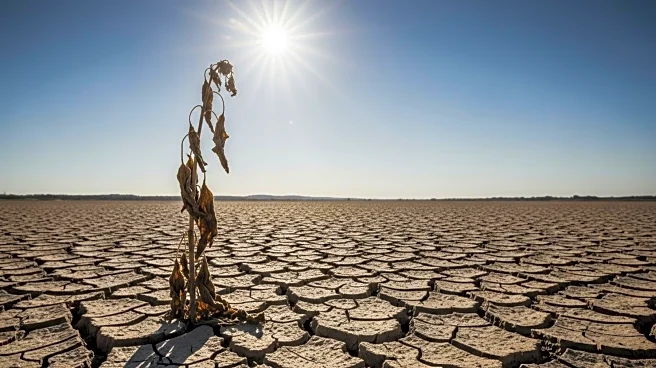What's Happening?
Finance Minister Muhammad Aurangzeb has highlighted a severe crisis in the agriculture sector, which is crucial to the country's economy. The sector is facing multiple challenges, including crop failures, low yields, and farmer migration to urban areas. These issues are compounded by climate-related events such as floods and droughts, as well as economic pressures like inflation, which increase the cost of agricultural inputs such as seeds and fertilizers. The minister noted that these factors have led to a significant reduction in credit disbursement by the Zarai Taraqiati Bank Limited (ZTBL), which has nearly halved over two years. The minister also pointed out inefficient farming practices as a contributing factor to the sector's low productivity.
Why It's Important?
The agriculture sector's struggles have significant implications for the economy, as it is a major source of employment and food production. The decline in credit disbursement affects farmers' ability to invest in their operations, potentially leading to further reductions in crop yields and exacerbating food insecurity. The migration of farmers to cities could lead to increased urban poverty and strain on urban infrastructure. Additionally, the economic challenges faced by farmers, such as inflation and high input costs, could lead to higher food prices, affecting consumers nationwide. Addressing these issues is crucial for stabilizing the agriculture sector and ensuring food security.
What's Next?
The government may need to consider policy interventions to support the agriculture sector, such as providing subsidies for inputs or investing in modern agricultural practices. There could also be discussions on improving credit access for farmers to help them manage their cash flow and invest in productivity-enhancing technologies. Stakeholders, including policymakers and agricultural organizations, may need to collaborate to address the root causes of the crisis and develop sustainable solutions.
Beyond the Headlines
The crisis in the agriculture sector highlights broader issues related to climate change and economic resilience. As climate events become more frequent and severe, there is a need for adaptive strategies in agriculture to mitigate their impact. The situation also underscores the importance of diversifying income sources for rural communities to reduce their vulnerability to economic shocks. Long-term investments in education and technology could play a role in transforming the sector and improving its sustainability.










